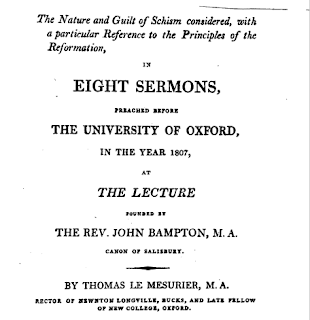'Nothing but what is practicable by all': Le Mesurier's Bampton Lectures on excessive asceticism
This reflected a consistent Old High understanding of a moral vision and ethical teaching which was grounded in ordinary duties, responsibilities, and obligations, lived out by spouses, neighbours, friends, and citizens, rather than in sectarian withdrawal.
Le Mesurier also repeated the wise Old High concern at the the destructive pastoral consequences of excessive asceticism. Inevitably this damages the living out of the Christian moral vision in ordinary life, obscuring (at best) the call to walk in the way of the Commandments.
In other words, it is precisely the conventional, boring, unglamorous nature of the Old High moral vision, deeply sceptical of heroic, 'Weird' acts of asceticism, which ensures a focus on the living out the Commandments in daily life.
Nor, indeed, can it be shewn, that the leaders of these sects did actually, either by example or practice, directly encourage any such impure or disorderly mode of living: nay, I rather think that they professed, and perhaps practised a greater severity of manners, and more strict self-denial, which will afford proof of what I have before alleged, that we must not too implicitly consider sanctity of life as a proof either of sincerity in the individual, or truth in his doctrine.
There were, indeed, some sects and some individuals, whose precepts and conversation were avowedly sensual. Such were the Nicolaitans, and such, most probably, were Hymenæus and Philetus, who denied the resurrection: a denial which we can hardly conceive that any man could make, except with a view of encouraging himself and others in licentious habits.
It is probable too, that among the Gnostics and the followers of Manes, there were those who, finding the rule of their masters too strict, applied themselves to the bending of it, so as to make it favour their own particular propensities. This is, indeed, what will always happen. It happened most signally among the monks of later times. Where unnatural restraints are imposed, they will be eluded or broken through, and cause men to err in the opposite extreme.
The commandments of God, on the other hand, are known by this, that they enjoin nothing but what is practicable by all.




Comments
Post a Comment